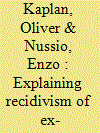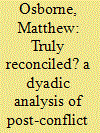|
|
|
Sort Order |
|
|
|
Items / Page
|
|
|
|
|
|
|
| Srl | Item |
| 1 |
ID:
131696


|
|
|
| 2 |
ID:
157509


|
|
|
|
|
| Summary/Abstract |
What determines the recidivism of ex-combatants from armed conflicts? In postconflict settings around the world, there has been growing interest in reintegration programs to prevent ex-combatants from returning to illegal activities or to armed groups, yet little is known about who decides to “go bad.” We evaluate explanations for recidivism related to combatant experiences and common criminal motives by combining data from a representative survey of ex-combatants of various armed groups in Colombia with police records of observed behaviors that indicate which among the respondents returned to belligerent or illegal activities. Consistent with a theory of recidivism being shaped by driving and restraining factors, the results suggest that factors such as antisocial personality traits, weak family ties, lack of educational attainment, and the presence of criminal groups are most highly correlated with various kinds of recidivism and hold implications for programs and policies to successfully reintegrate ex-combatants into society.
|
|
|
|
|
|
|
|
|
|
|
|
|
|
|
|
| 3 |
ID:
186064


|
|
|
|
|
| Summary/Abstract |
Disarmament, demobilization, and reintegration (DDR) processes will often dismantle the command-and-control structures of non-state armed groups (NSAGs) to prevent possible remobilization. Recent studies demonstrate that in some cases ex-combatant networks provide important social and economic support that hasten transitions to civilian life; however, this literature focuses exclusively on networks that emerge among commanders, peers, and foot soldiers. In this article, we broaden existing literature on ex-combatant networks by examining the role that family relations play in combatants’ war and post-war trajectory. Drawing on 18 life history interviews with former male combatants from the Lord’s Resistance Army (LRA) we argue that the familial can often be as influential as peer-relations. Specifically, our study shows that, first, familiies can shape the defection, demobilization, and reintegration processes of ex-combatants, and, second, ex-combatant networks can play an important role in facilitating the reunion of families in the aftermath of war. The endurance of familial relations forged within NSAGs pose important considerations to DDR policies.
|
|
|
|
|
|
|
|
|
|
|
|
|
|
|
|
| 4 |
ID:
157587


|
|
|
|
|
| Summary/Abstract |
In the aftermath of civil war or violent internal conflict, one of the key peacebuilding challenges is the reconciliation of former enemies who are members of the same small-scale societies. A failure of social reintegration may contribute to what is known as a conflict trap. To detect lingering hostile attitudes among a community’s various factions is crucial, but the approaches adopted in previous studies tend to focus on the impact of conflict on one or other aggregated indicator of social cohesion rather than on how violence-affected individuals regard and act towards their fellow community members. Here we demonstrate the value of concentrating on this latter dyadic component of social interactions and we use behavioural experiments and a social tie survey to assess, in an appropriately disaggregated manner, social cohesion in a post-conflict setting in northern Uganda. Whereas in self-reported surveys, ex-combatants appear to be well-connected, active members of their communities, the experiments unveil the continued reluctance of other community members to share or cooperate with them; fewer resources are committed to ex-combatants than to others, which is statistically significant. The dyadic nature of our analysis allows us to detect which groups are more prone to discriminate against ex-combatants, which may help facilitate targeted interventions.
|
|
|
|
|
|
|
|
|
|
|
|
|
|
|
|
|
|
|
|
|